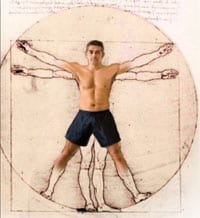Macho Men Why Avoiding the Doctor Is Putting Guys at Risk
Dr. Lorenver Po recalled a man who didn’t think much of stepping on a nail — not enough to call his doctor, anyway.
“Basically, he thought, ‘it’s just a small nail,’” said Po, an internist at Holyoke Associates in Internal Medicine. “But he came here to see a doctor after a couple of weeks. By that time, the foot was swelling, and the infection had gone much deeper — and was much harder to treat.”
If your reaction to that story is something along the lines of ‘typical man,’ you’re buying into a stereotype — that men are too stubborn, too busy, or too macho to visit the doctor’s office. But, unlike many stereotypes, this one has some truth behind it.
The evidence is more than anecdotal. Data from the Centers for Disease Control show that men are 50{06cf2b9696b159f874511d23dbc893eb1ac83014175ed30550cfff22781411e5} less likely to seek preventative health care than women. And according to a survey conducted by Esquire magazine earlier this year, fully one-half of men ages 18 to 50 don’t have a primary-care physician, and one-third haven’t had a checkup in more than a year.
Furthermore, according to the survey, about 40{06cf2b9696b159f874511d23dbc893eb1ac83014175ed30550cfff22781411e5} of men in their 40s have never had their cholesterol tested, and 70{06cf2b9696b159f874511d23dbc893eb1ac83014175ed30550cfff22781411e5} have never had a prostate exam.
“It’s a stereotype about men that they don’t like to go to the doctor, that they’d rather just go when there’s a problem,” said Ryan D’Agostino, the magazine’s articles editor. “We had hoped it wasn’t this true.”
Yet, numerous studies and the experiences of primary-care doctors say it certainly is true — and risky. Because men put off going to the doctor, when they do get diagnosed, their diseases tend to be more advanced and more expensive to treat, said Dr. Muhammad Gul, medical director of Baystate Medical Practices – Quabbin Adult Medicine in Ware.
“Men have this macho self-image; they think they can deal with the minor stuff. It’s human nature — they don’t think they’re going to get any diseases or other kinds of medical problems,” he told HCN.
“They won’t go in for common colds or aches and pains, but sometimes those things can change into a major issue,” he added. “For example, some people working in construction might develop a shoulder injury or back injury, and they try to tough it out; I’ve seen people damaging their back and having problems with rotator-cuff surgeries and other complications.”
Frank Henrichon is one of those men. He had been feeling unusually tired, but put off asking his doctor — Gul — about it for some time.
“I was like most 50-year-old guys I know,” he said. “We just don’t make time to see a doctor. I personally had avoided a doctor because I was afraid — I was afraid that someone would tell me that I had something terrible, or maybe even cancer.”
That fear was borne out by his visit with Gul, who told Henrichon he had developed diabetes. But it was news he needed to face, because putting it off further would have allowed the condition to go untreated and worsen. Instead, Gul persuaded him to alter some bad habits.
“The first step was to change my diet,” said Henrichon. “I now eat healthier, only have pasta and beer on special occasions, and I walk regularly with my daughter. I even participate in health screenings offered at work, something I used to avoid.”
That’s a story primary-care doctors are trying to repeat every day. But there’s nothing they can do if patients won’t pay them a visit. And too many men, for a variety of reasons, are stubbornly staying away.
Keeping Their Distance
It’s not uncommon for a patient to say he hasn’t seen a doctor since childhood, Gul said, adding that some men feel like nothing good comes from seeing a physician. In reality, he explained, a doctor can suggest lifestyle changes — from an altered diet to a simple walk around the block every day — that can drastically improve quality of life.
“Many men view going to the doctor as a sign of weakness,” he added. “However, nothing could be further from the truth.”
It’s not just a single factor, Po said, that keeps men away from their physician’s office, but rather a combination of things.
“For one thing, men have their pride,” he explained. “They feel like they don’t need help. So if there’s pain, they think, ‘it’s just a small pain — I can take that.’
Second, he said, men tend to procrastinate, thinking whatever is bothering them will get better on its own. In addition, “men are busy; we have a lot of things going on, so we say, ‘this isn’t really bothering me; let’s wait.’ We’re also sometimes embarrassed about the things going on with our system, so we don’t want to see anybody about it.”
Finally — but not least significantly, Po said — there’s denial. “They simply say, ‘I don’t have this,’ and they end up in even worse shape, so when they do come in, it’s a little harder to change it back or take care of the problem.”
Any one of those factors may have influenced one of Po’s patients, a 50-something man who was experiencing a tingling sensation in his chest. “He didn’t think much of it and didn’t tell anyone about it,” Po said. “Later on, he felt heaviness in his chest. If we had seen him earlier, we would have done a workup and found out whether this had something to do with his heart” — which, as it turned out, it did.
A case like that frustrates doctors who realize that heart disease ranks among the top killers of men in the U.S., yet many cardiac conditions are more treatable the earlier they are detected.
According to Dr. Roger Lafleur, an Emergency Department physician at Baystate Mary Lane Hospital, “one of the biggest obstacles to improving the health of men is men themselves. We want men to understand that ignoring minor issues can lead to major problems that will often land them in the emergency room.”
Many men think they’re in good health, but feeling good doesn’t always mean nothing is wrong, he added. “For instance, someone who dodges doctor visits might not know whether their cholesterol or blood pressure is too high. Those problems don’t have obvious symptoms, but can lead to serious illness.”
That’s why doctors emphasize yearly checkups, Gul said, “so we can screen them for chronic illness, blood pressure, cholesterol, diabetes, and other things. We ask them questions about their family history and risk factors, and screen them for all these chronic conditions.”
Sometimes, the doctor will catch something early enough to treat it without much trouble.
“Their blood sugar might not be in the diabetic range, but they’re prediabetic,” Gul said. “I’ll suggest lifestyle changes and follow up. If you lose 7{06cf2b9696b159f874511d23dbc893eb1ac83014175ed30550cfff22781411e5} of your body weight, you can decrease the progression of diabetes by 50{06cf2b9696b159f874511d23dbc893eb1ac83014175ed30550cfff22781411e5}.
“Our goal is prevention of disease,” he continued, adding that national health policy, with an eye toward soaring costs in health care, is more than ever before focused on disease prevention, not just cure. “It’s more cost-effective than getting admitted to the hospital.”
Knowledge Is Power
Patient education, Gul said, remains one of the most underrated components of a primary-care practice.
“Most people, when they first come in, aren’t aware of their risk factors,” he told HCN. “We kind of dig into their family history and tell them what their risk factors are for chronic ailments, high blood pressure, and diabetes, and we give them an approach for preventing these complications.”
Routine screenings — from prostate exams to colonoscopies — are also critical as men move into middle age, Gul said; even though they’re not the most pleasant experiences, detecting a problem early can add years to a patient’s life.
“Colon cancer is the third-leading cause of death for men in the U.S.,” he noted. “It’s a slow-growing cancer, but by the time it’s diagnosed, it has often spread. That’s why we do the screening. It’s the same with prostate cancer. If we can detect cancer early, people can have a longer lifespan.”
A primary-care doctor can also be persuasive in helping men understand the link between the stresses of daily life and their health, the need to quit smoking or to cut back on alcohol, or even the importance of good dental habits. “There are some diseases that originate from poor dental hygiene, because it’s the gateway to your mouth,” Gul said.
Some of these lifestyle changes are simple common sense, Po added, but it’s often more impactful to hear them suggested by a doctor.
“Smoking is number one” on the list of habits to alter, he added. “But people think so lightly of it. The same goes for the risk factors for heart problems — cholesterol, weight, blood pressure.
“People don’t want to be scolded about what they’re doing wrong,” he continued. “But we’re in an age when preventative measures are the primary goal. We know that prevention is much easier than curing someone.”
Lafleur understands that men can be naturally stubborn, but they should consider it’s not only their well-being at stake when they refuse to seek medical care.
“Not only does poor health significantly decrease the quality of a man’s life, it takes a heavy toll on their spouses,” he explained. “We know through studies that 50{06cf2b9696b159f874511d23dbc893eb1ac83014175ed30550cfff22781411e5} of widowed, elderly women living in poverty today were not poor before their husbands died. Many men are unaware that simple screening tests and lifestyle changes can dramatically improve their quality of life and the lives of the people they love.”
That’s good advice, said Henrichon, who wishes he had seen the doctor sooner, if only to ease his own anxieties by honestly facing them.
“The best part,” he said, “is that I’m not staying awake at night living in fear about my health anymore.”
Fear. Denial. Procrastination. Embarrassment. Macho pride. A simple visit to the doctor can treat all of that — and perhaps a good deal more.




Comments are closed.